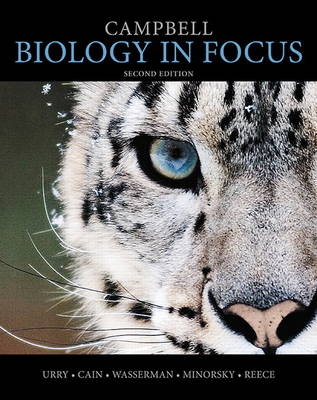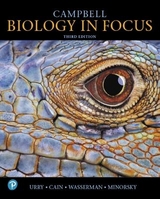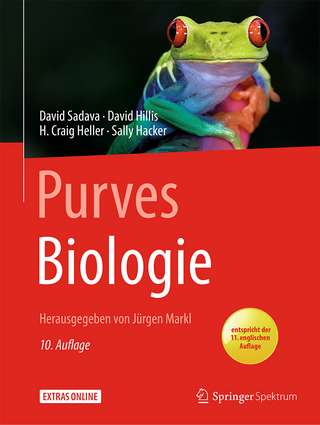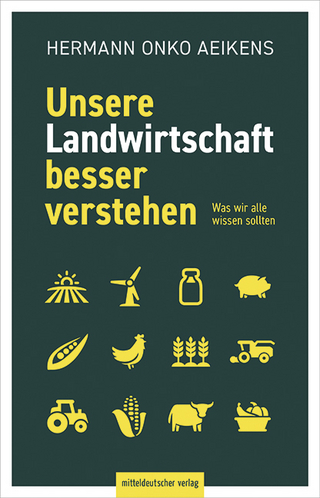
Campbell Biology in Focus
Pearson (Verlag)
978-0-321-96275-1 (ISBN)
- Titel erscheint in neuer Auflage
- Artikel merken
Key Topics: Introduction: Evolution and the Foundations of Biology, The Chemical Context of Life, Carbon and the Molecular Diversity of Life, A Tour of the Cell, Membrane Transport and Cell Signaling, An Introduction to Metabolism , Cellular Respiration and Fermentation, Photosynthesis, The Cell Cycle, Meiosis and Sexual Life Cycles, Mendel and the Gene Idea, The Chromosomal Basis of Inheritance, The Molecular Basis of Inheritance, Gene Expression: From Gene to Protein, Regulation of Gene Expression, Development, Stem Cells, and Cancer, Viruses, Genomes and Their Evolution, Descent with Modification, Phylogeny, The Evolution of Populations, , The Origin of Species, Broad Patterns of Evolution, Early Life and the Diversification of Prokaryotes, The Origin and Diversification of Eukaryotes, The Colonization of Land, The Rise of Animal Diversity, , Plant Structure and Growth, Resource Acquisition, Nutrition, and Transport in Vascular Plants, Reproduction and Domestication of Flowering Plants, Plant Responses to Internal and External Signals, The Internal Environment of Animals: Organization and Regulation, Animal Nutrition, Circulation and Gas Exchange, The Immune System, Reproduction and Development, Neurons, Synapses, and Signaling, Nervous and Sensory Systems, Motor Mechanisms and Behavior, Population Ecology and the Distribution of Organisms, Species Interactions , Ecosystems and Energy, Global Ecology and Conservation Biology
Market: This book is a useful reference for anyone who wants to learn essential content, concepts, and scientific skills needed for introductory biology.
Lisa A. Urry Lisa Urry (Chapter 1 and Units 1 and 2) is Professor of Biology and Chair of the Biology Department at Mills College in Oakland, California, and a Visiting Scholar at the University of California, Berkeley. After graduating from Tufts University with a double major in biology and French, Lisa completed her Ph.D. in molecular and developmental biology at Massachusetts Institute of Technology (MIT) in the MIT/Woods Hole Oceanographic Institution Joint Program. She has published a number of research papers, most of them focused on gene expression during embryonic and larval development in sea urchins. Lisa has taught a variety of courses, from introductory biology to developmental biology and senior seminar. As a part of her mission to increase understanding of evolution, Lisa also teaches a non-majors course called Evolution for Future Presidents and is on the Teacher Advisory Board for the Understanding Evolution website developed by the University of California Museum of Paleontology. Lisa is also deeply committed to promoting opportunities for women and underrepresented minorities in science. Lisa is also a co-author of Campbell Biology. Michael L. Cain Michael Cain (Chapter 1 and Units 3, 4, and 7) is an ecologist and evolutionary biologist who is now writing full-time. Michael earned a joint degree in biology and math at Bowdoin College, an M.Sc. from Brown University, and a Ph.D. in ecology and evolutionary biology from Cornell University. As a faculty member at New Mexico State University and Rose-Hulman Institute of Technology, he taught a wide range of courses, including introductory biology, ecology, evolution, botany, and conservation biology. Michael is the author of dozens of scientific papers on topics that include foraging behavior in insects and plants, long-distance seed dispersal, and speciation in crickets. In addition to his work on Campbell Biology and Campbell Biology in Focus, Michael is also the lead author of an ecology textbook. Steven A. Wasserman Steve Wasserman (Chapter 1 and Unit 6) is Professor of Biology at the University of California, San Diego (UCSD). He earned his A.B. in biology from Harvard University and his Ph.D. in biological sciences from MIT. Through his research on regulatory pathway mechanisms in the fruit fly Drosophila, Steve has contributed to the fields of developmental biology, reproduction, and immunity. As a faculty member at the University of Texas Southwestern Medical Center and UCSD, he has taught genetics, development, and physiology to undergraduate, graduate, and medical students. He currently focuses on teaching introductory biology. He has also served as the research mentor for more than a dozen doctoral students and more than 50 aspiring scientists at the undergraduate and high school levels. Steve has been the recipient of distinguished scholar awards from both the Markey Charitable Trust and the David and Lucille Packard Foundation. In 2007, he received UCSD's Distinguished Teaching Award for undergraduate teaching. Steve is also a co-author of Campbell Biology. Peter V. Minorsky Peter Minorsky (Chapter 1 and Unit 5) is Professor of Biology at Mercy College in New York, where he teaches introductory biology, evolution, ecology, and botany. He received his B.A. in biology from Vassar College and his Ph.D. in plant physiology from Cornell University. He is also the science writer for the journal Plant Physiology. After a postdoctoral fellowship at the University of Wisconsin at Madison, Peter taught at Kenyon College, Union College, Western Connecticut State University, and Vassar College. His research interests concern how plants sense environmental change. Peter received the 2008 Award for Teaching Excellence at Mercy College. Peter is also a co-author of Campbell Biology. Jane B. Reece The head of the author team for recent editions of Campbell Biology, Jane Reece was Neil Campbell's longtime collaborator. Earlier, Jane taught biology at Middlesex County College and Queensborough Community College. She holds an A.B. in biology from Harvard University, an M.S. in microbiology from Rutgers University, and a Ph.D. in bacteriology from the University of California, Berkeley. Jane's research as a doctoral student and postdoctoral fellow focused on genetic recombination in bacteria. Besides her work on Campbell Biology in Focus, she has been a coauthor of Campbell Biology, Campbell Biology: Concepts & Connections, Campbell Essential Biology, and The World of the Cell. Neil A. Campbell Neil Campbell (1946-2004) combined the investigative nature of a research scientist with the soul of an experienced and caring teacher. He earned his M.A. in zoology from the University of California, Los Angeles, and his Ph.D. in plant biology from the University of California, Riverside, where he received the Distinguished Alumnus Award in 2001. Neil published numerous research articles on desert and coastal plants and how the sensitive plant ( Mimosa) and other legumes move their leaves. His 30 years of teaching in diverse environments included introductory biology courses at Cornell University, Pomona College, and San Bernardino Valley College, where he received the college's first Outstanding Professor Award in 1986. Neil was a visiting scholar in the Department of Botany and Plant Sciences at the University of California, Riverside.
1. Introduction: Evolution and the Foundations of Biology
UNIT 1: CHEMISTRY AND CELLS
2. The Chemical Context of Life
3. Carbon and the Molecular Diversity of Life
4. A Tour of the Cell
5. Membrane Transport and Cell Signaling
6. An Introduction to Metabolism
7. Cellular Respiration and Fermentation
8. Photosynthesis
9. The Cell Cycle
UNIT 2: GENETICS
10. Meiosis and Sexual Life Cycles
11. Mendel and the Gene Idea
12. The Chromosomal Basis of Inheritance
13. The Molecular Basis of Inheritance
14. Gene Expression: From Gene to Protein
15. Regulation of Gene Expression
16. Development, Stem Cells, and Cancer
17. Viruses
18. Genomes and Their Evolution
UNIT 3: EVOLUTION
19. Descent with Modification
20. Phylogeny
21. The Evolution of Populations
22. The Origin of Species
23. Broad Patterns of Evolution
UNIT 4: THE EVOLUTIONARY HISTORY OF LIFE
24. Early Life and the Diversification of Prokaryotes
25. The Origin and Diversification of Eukaryotes
26. The Colonization of Land
27. The Rise of Animal Diversity
UNIT 5: PLANT FORM AND FUNCTION
28. Plant Structure and Growth
29. Resource Acquisition, Nutrition, and Transport in Vascular Plants
30. Reproduction and Domestication of Flowering Plants
31. Plant Responses to Internal and External Signals
UNIT 6: ANIMAL FORM AND FUNCTION
32. The Internal Environment of Animals: Organization and Regulation
33. Animal Nutrition
34. Circulation and Gas Exchange
35. The Immune System
36. Reproduction and Development
37. Neurons, Synapses, and Signaling
38. Nervous and Sensory Systems
39. Motor Mechanisms and Behavior
UNIT 7: ECOLOGY
40. Population Ecology and the Distribution of Organisms
41. Species Interactions
42. Ecosystems and Energy
43. Global Ecology and Conservation Biology
| Erscheint lt. Verlag | 15.10.2015 |
|---|---|
| Sprache | englisch |
| Maße | 10 x 10 mm |
| Gewicht | 2550 g |
| Themenwelt | Naturwissenschaften ► Biologie |
| ISBN-10 | 0-321-96275-3 / 0321962753 |
| ISBN-13 | 978-0-321-96275-1 / 9780321962751 |
| Zustand | Neuware |
| Informationen gemäß Produktsicherheitsverordnung (GPSR) | |
| Haben Sie eine Frage zum Produkt? |
aus dem Bereich



